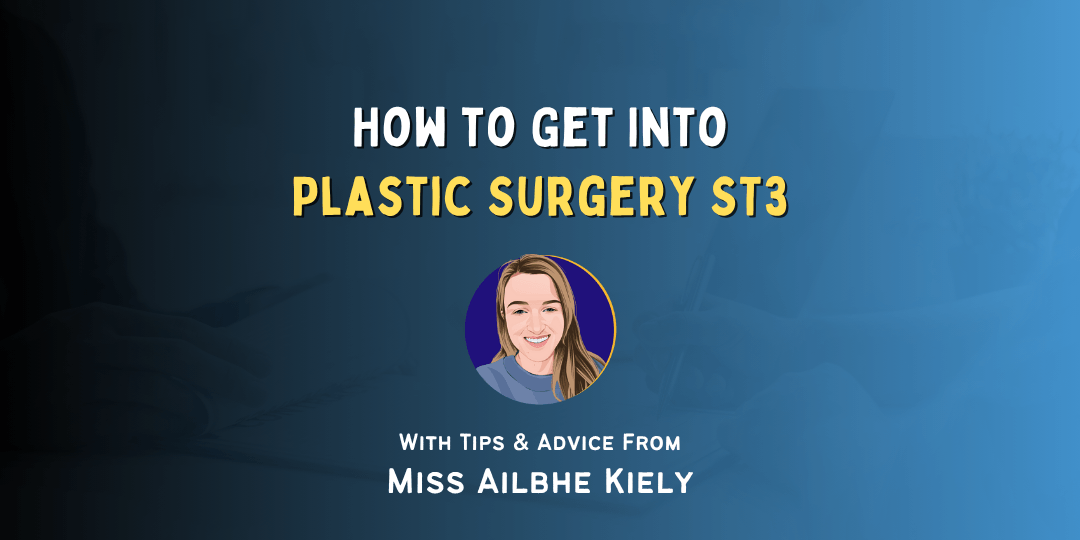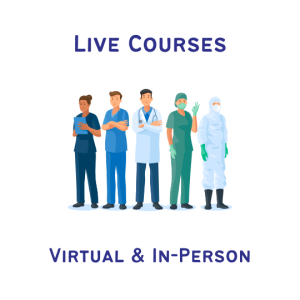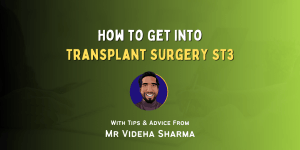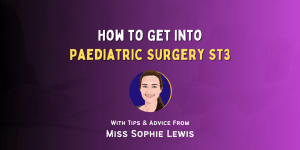
Published October 24, 2025 | Updated December 2, 2025
By MedCourse
Useful, relevant, and interesting content for UK Junior Doctors.
About the Author

Miss Ailbhe Kiely, ST6 Registrar in Plastic Surgery, North West Deanery
After completing medical school and an intern year in Dublin, Ireland, I moved to the UK to pursue plastic surgery training. After one clinical fellow year in London, I got into plastic surgery themed core training in the West Midlands, and then straight onto plastic surgery specialty training in the North-West.
Courses & Conferences to Attend
In terms of courses to build my clinical skills before becoming a registrar, I did the emergency management of the severe burn (EMSB) course, a hand trauma course, and an elective hand cadaver course.
From an exam and interview preparation point of view, I never actually did an exam preparation course, but I did do two courses in preparation for my ST3 interview, which were great. I did the BAAPS course, which was an online course, and the Doctor’s academy online course, which I’ve since before faculty for. These were really helpful in terms of benchmarking and getting consultant feedback on interview performance and seeing where I needed to improve ahead of the real thing.
I think a mixture of interview preparation courses and practical courses aimed at preparing your operative skills for being a registrar is best.
The practical courses are best done right before you’re about to put them to use, I think – ideally in the months before starting as a registrar, or while on the relevant placements.
My advice for the ST3 interview prep courses is to definitely do at least one course, but supplement this with your own practice group.
How to Maximise Your Portfolio
The portfolio can score you really valuable points in your Plastics application, and it is important to get a copy of the portfolio marking scheme ASAP before applying, so that you can work towards ticking off these many domains.
Firstly, high-quality, high-yield research and audit projects not only give you portfolio points but also something to talk about in the structured interview portion of the interview. I decided to undertake a part-time master’s, which scored me points across an academic prize, a higher degree, having high-quality papers, and also something to talk about at an interview, so this was really worthwhile for me.
Otherwise, seek out research-minded supervisors early on and ask for a project from these people. Make sure you background check to see that they actually publish, rather than talk about publishing.
Clinically, the operative numbers are important, but so too is the experience you glean from operating. Being able to discuss why you prefer one type of flexor repair to another at an interview is far more valuable than the logbook number you have completed in terms of point scoring. Take each case as a holistic learning opportunity, read in advance, and ask important questions
My main advice is to stay organised, track your progress, and be realistic with what you can achieve in the time you have.
Competition Ratios
In 2025, the competition ratio for Plastic Surgery ST3 was 6.69, with 281 applications for 42 places. This follows the trend of other speciality placements, with Plastics applications increasing by around 1/3 since 2021.
Demand for Plastic Surgeons remains high, particularly in aesthetic procedures, which have risen 40% since 2020. According to Dr. Ahmed Alsayed of Signature Clinic, there has been a clear rise in demand for services related to cosmetic surgery for former athletes, particularly those who have sustained injuries that have augmented their looks. Dr Hisham Abouzeid from Transform® adds that this rise has been seen particularly in blepharoplasty (with a 13% rise reported by BAAPS in 2024), with the most popular cosmetic procedure being breast augmentation.
So, it looks like you won’t be out of a job as a plastic surgeon (especially if interested in cosmetics), if you can grab your NTN in the first place.
Making the Most of Your Day Job
On a plastics SHO job, when there are almost always no FY doctors, you will have to balance your service provision requirements and your training needs. Be proactive and always look for opportunities to get to the theatre and to learn from your seniors. This sometimes will require coming in on off days are staying on out of hours, but this can be really high yield if done. It’s a case of ‘dressing for the job you want”. As a CT2, I was given some reg responsibilities because I professionally conducted myself and showed my seniors that I have operative and clinical skills that would be useful to the team. You may find that as an SHO you have to ask to participate or take the lead in a surgery – this isn’t unusual, and most of the time, if you ask, you will be allowed to do so, even in part.
Making the Most of Plastic Surgery ST3 Placements
Have early conversations with your seniors about what your experience is to date and what exactly you want to get out of the placement. Treat it like a job interview – you may end up wanting to work in that unit in the future! Be on time, proactive, and enthusiastic.
As suggested before, figure out who is research-minded and ask about projects that can keep you potentially linked to the department after you finish. You might be able to secure an honorary contract to come back and come to lists, etc, when you’ve finished.
What About Non-Plastic Surgery ST3 Placements?
My advice would be not to disregard these placements as irrelevant – in fact, they are extremely relevant, as will likely be the last time you are exposed to medicine, for example. Try to get as much experience and knowledge from these placements as possible. In plastics, there are lots of critical care needs for the patients we look after – for example, severe burn injuries, and paying attention to acute medicine and other body systems will contribute to your capacity to look after the unwell plastics patient.













